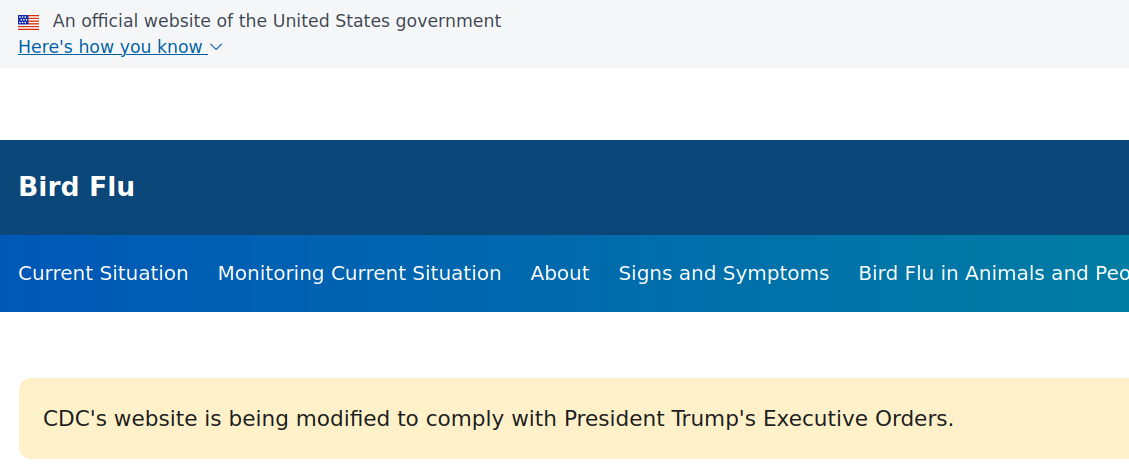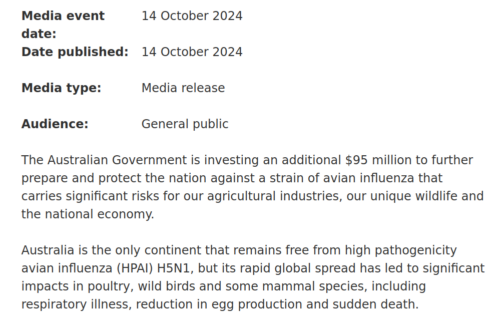The Covid situation has settled down now and most of us have gone back to living our lives almost as we were before the pandemic started. Many (foolish) people believe it is actually over. The rest of us are making the best of things and have incorporated new safety precautions into our lives according to our needs and priorities. As a retired person, as well as a natural introvert, I am lucky to be able to continue living a relatively secluded lifestyle. Vaccines have helped me feel less vulnerable in spite of my age.
I’ve had this file on my computer for a while and I keep tinkering with it and then ignoring it again, but the recent talk of H5N1 virus (bird flu) particularly in the US, a country that no longer has protective health safeguards to prevent spreading their diseases to the rest of us out here in the real world, reminded me yet again how vulnerable we are to pandemics.

I had almost forgotten about writing this, and the strong feelings which prompted these reflections at the time, but many of these feelings are still bubbling just below the surface of conscious thought. While I don’t have the ability to switch off and ignore the threat of pandemic, I feel lucky to have an innate ability to deal with the psychological effect of it.
As my daughter said at the time: “You were born for this Mum”.
A Journal of the First Covid 19 Lockdown
Day [whatever] of Social Lockdown – Australia 2020
I actually have no idea what day it is in this silly saga. Why would I count how long it is since I’ve been asked to stay in my own home? This is where I live. I haven’t been evicted from my house or my country. I am not a refugee. Quite the reverse, I am safe at home.
After years of being laughed at by the so-called normal people around me, to the point of feeling slightly bullied. Being derided for my lack of interest in social events and gatherings; encouraged to forego my natural pleasures at home in order to get-out-of-the-house; feeling not just victimized but somehow abnormal, I find myself in the odd situation of watching the effect of social distancing (stupid phrase), on the extroverts around me. The daily chatter on TV and social media about the “inevitable” mental health issues that will be created by this unusual state of affairs.
The slow dawning realisation that all these “healthy normal” people are so terrified of spending a few hours alone that they will go to extraordinary lengths to create opportunities to leave their houses. Literally risking death to avoid spending even half an hour alone with THEMSELVES.
My first response was a feeling of self-satisfaction that I had gone from thinking of myself as THE OTHER – the outsider, to feeling normal, in just a few short days. Now I am trying to acquire some sense of empathy, to feel compassion. After all what depths of self-loathing or fear must people be experiencing, to respond like this?
How have we reached this state of affairs in our society that people no longer have even a modicum of emotional self-reliance? It has long been obvious that as technology has advanced we have lost many of the physical skills that made our ancestors so much more self sufficient than us. Many people try to retain or relearn some of these skills; growing their own food; making their own clothes, but most of this is carried on at a hobby level and we all rely to some extent on modern technology to provide us with the basics we need to survive.
I have read enough fiction over the years to know that I am ill-prepared for a natural disaster like an earthquake, hurricane, or tsunami, but I live a life in which those events are extremely unlikely. Even the far more possible occurrence of a bush-fire or flood would test my physical capabilities to their limits, but I know that I would probably be protected by others more capable than I am, should I find myself in those circumstances.All of us seem to have a sense of being able to cope with physical disaster. Even the recent toilet paper fiasco is just a symptom of our instinct for self-preservation. People didn’t know how to respond appropriately to the emergency they found themselves in so they reacted with panic buying of the first thing that came to mind.

Illness and disease are more of a concern, but again I live within reach of some of the best hospital facilities in the world. Pandemic illness on the scale we are seeing now though is quite different to anything I had previously imagined in my safe life, but even now, I can protect myself physically by following the medical advice, isolate myself as much as possible, and hope for the best. I am in the vulnerable age group and feel concerned, but still I don’t feel overwhelmed by the dangers.
A house burnt down or flooded can be rebuilt. Even the massive destruction of an earthquake or hurricane can be fought against with physical energy. Experts may be needed to do the main work of reconstruction but everyone can contribute something to the rebuilding. Most of all people seem to feel empowered to fight against a physical threat.
In contrast the psychological threat of the current situation appears to be beyond the ability of many people to deal with. It seems that they are overwhelmed by how to cope with the abstract nature of the threat to their lifestyle. This is not a physical threat in the sense of something they can see attacking them.
Have we so distanced ourselves from reality that the idea of silence, solitude, thinking for and about ourselves has become a threat to us. Surely this isn’t natural. Yes, in the past people have tended to congregate into groups, tribes, villages – for protection and companionship, but we have also had the resilience to stand alone if necessary and fend for ourselves.
In the more recent past as our villages became towns and cities, people sought out solitude from time to time to restore ourselves and come back to social interactions refreshed. We were once overwhelmed by too much social contact. People crammed together in daily life by the necessity of work looked forward to weekends and holidays to escape.
What happened to make many of us so dependent on being surrounded by others that they are no longer able to function at even the most basic level without constant emotional feedback and reassurance, from other people, to confirm that they exist?
Categories: opinion